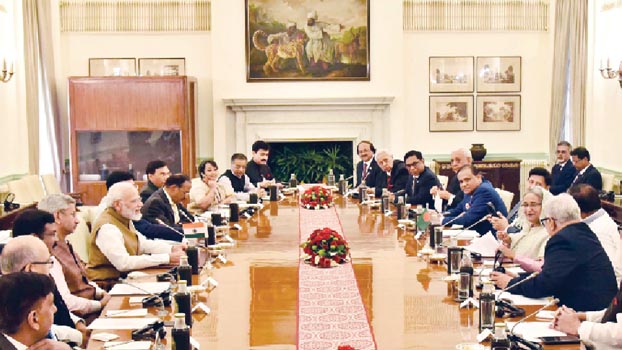Pluralism is the force of South Asia: PM


Prime Minister Sheikh Hasina has said that pluralism is a strong point of South Asian region and countries in the area should move beyond ‘majority-minority mindset’ to uphold diversity.
Speaking at the closing plenary session of the India Economic Summit of the World Economic Forum (WEF) in New Delhi on Friday evening, she urged South Asian countries to work together to defeat common challenges like poverty.
“We should strive to secure peace, stability and harmony for every individual across our societies. We must move beyond the majority-minority mindset. Pluralism has been a strength of South Asian countries for centuries. So, we should be able to celebrate South Asia’s regional, ethnic and linguistic diversity. This is fundamental,” said Hasina.
She highlighted Bangladesh’s efforts to resolve difficult issues through diplomacy and pointed to the Rohingya refugees issue with Myanmar as an example that her government is trying to resolve through dialogue.
Hasina’s remarks about majority-minority assume importance as it came a day before her talks with Indian Prime Minister Narendra Modi in the backdrop of the contentious National Register of Citizens (NRC) in Assam which has brought to fore religious, ethnic and linguistic faultiness in the state.
Hasina, now on a four -day official visit to India, termed Bangladesh as a “secular progressive” country and said her government follows a policy of “zero tolerance” towards corruption and terrorism.
Hasina put forward a four-point plan to promote collaboration in South Asia to help manage its geo-political realities through collaboration.
“In the past decades, we saw many lofty regional ideas and initiatives. Some succeeded, others could not deliver. As I look into the next decades, we should follow the following four ideas to make the region connected, always ready to make bridges with other regions for mutual benefits of the nations,” she said.
Hasina said it must be ensured that inequality across societies could not widen in times of faster growth as wealth creation should be inclusive and must trickle down to the bottom millions.
“Less developed communities or countries should not lag behind. We need to hold hands of ‘others’ across South Asia through our knowledge – experience – expertise – investments,” she added.
She said mutual trust and mutual respect between all communities and countries in South Asia are keys. So, misperceptions and false apprehensions need to be got over.
Bangladesh has consistently been contributing to international peace and security in global spheres, emanating from its policy of “Friendship with all, Malice to none”, as laid out by Father of the Nation Bangabandhu Sheikh Mujibur Rahman, she said, adding this approach helped the country in maintaining good relations with all countries.
She pointed out that in 1996, Bangladesh resolved the issue of Ganges river-water sharing with India, adding “we also amicably delimited our maritime boundaries with India and Myanmar”.
Bangladesh and India are now developing trans-boundary river navigation, she said.
“We are buying power from India through inter-country grid connections. Such collaborative culture is essential across our politics, economy and society. On the other hand, our private sectors compete with each other on a transparent and fairly basis,” she added.
“Let us appreciate and balance regional political realties for the interest of our peoples. We cannot trade off long-term interests for short-term gains,” Hasina said.
She recalled that in 1971, it was the Father of the Nation of Bangladesh Bangabandhu Sheikh Mujibur Rahman made a clarion call to the Bangali people to stand up for their freedom and independence.
“Bangabandhu believed in the power of people and loved them. He realized that if Bangladesh is to sustain its development, it has to get connected with its neighbors and grow together,” she added.
The PM quoted Bangabandhu’s declaration in February 1972 in Kolkata as saying “we will cooperate with all in establishing peace in South Asia in order to live side by side as good neighbours and pursue constructive policies for the benefits of our people”.
She said that inspired by Bangabandhu’s visionary ideas and driven by his belief in shared prosperity through shared responsibility, Bangladesh continue to champion regional cooperation groupings like BIMSTEC, SAARC, BBIN, BCIM.
Later Hasina took part in a panel discussion. Deputy Prime Minister of Singapore Heng Swee Keat, Managing Director of Sequoia Capital India Shailendra Singh, Executive Vice Chairperson of Apollo Hospital Enterprise Shobana Karmineni and Chairwoman of Booking.com Gillian Tans were panelists in the event, moderated by WEF president Borge Brende.
She said her government is working to restore the previous connectivity in South Asia which was suspended after 1965. “We always think about it. We can make bridge in this region and beyond the region,” she said, adding that Bangladesh is playing a role in establishing the Asian Highway and the Asian Railway.
Describing poverty as the common enemy in this region, she said “all countries in the region should work together to fight the menace. We’ve the ability to do it and we’ll definitely do it.”
Hasina said Bangabandhu had realized importance of enhancing connectivity for the prosperity of the region.
She highlighted her government initiatives to ensure basis needs of the people following the footsteps of Bangabandhu as he liberated the country to make the people smile by freeing the country from poverty and hunger.
The Singaporean deputy prime minister appreciated Prime Minister Sheikh Hasina’s idea of working together to make the region stronger in terms of reducing poverty and exchanging cooperation.



